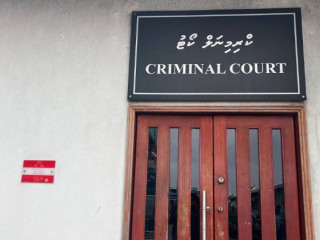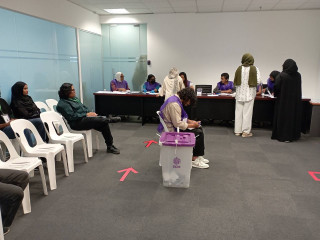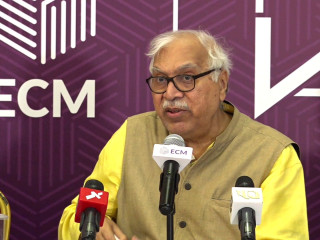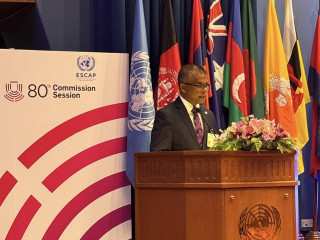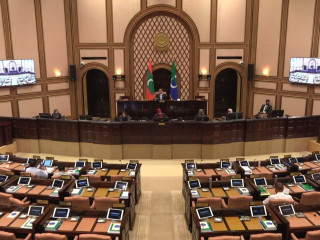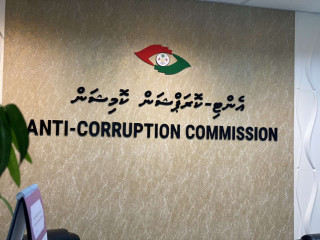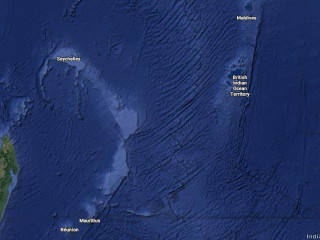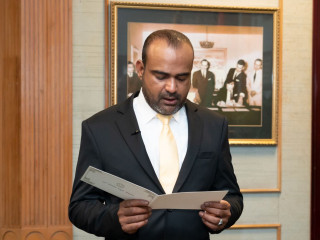Today, the sole powerhouse in Maroshi island of Shaviyani Atoll makes enough electricity to meet their basic day-to-day requirements. Two eighty-kilowatt generators supplied by the state churn day and night behind the walls of the powerhouse, a low-budget establishment with salvaged tin as walls and concrete to keep it standing.
Maroshi is one of the smaller islands in Shaviyani Atoll, to the north of the country, with a population of just roughly 800. Last month, these residents took to the streets in outrage over the state's failure to provide adequate utilities and electricity service to them.
Demonstrators hurled cruel aspersions at the state-operated Fenaka Corporation and its management. The company's Managing Director, Ahmed Shareef, responded to demonstrators by sending in a surplus generator at a neighbouring island, a decision that only served to intensify their outrage despite his assurances that it was only a 'temporary fix'.
Maroshi is not alone; Llohi and Landhoo islands in Noonu Atoll, Alifushi island of Raa Atoll, Villingili in Gaafu Alifu Atoll, Nadellaa in Gaafu Dhaalu Atoll, and southernmost Addu City have all experienced similar sporadic outrages that disrupted their commerce and life in the past three months. Even Maroshi island's neighbouring Bilehfahi island had to struggle to acquire replacement generators after a fire destroyed utterly razed its poorly built powerhouse.
While the Fenaka Corporation can't be made to bear sole responsibility, electricity production is a competitive industry, especially when operating in a country where fuel, equipment, and logistical procurement is nil and needs to be imported. This was until an audit report found rampant corruption within the Fenaka Corporation, making it part of a slew of graft allegations made against state-operated companies and institutions.
The report made public two weeks ago reveal that several transactions between 2014 and 2016 show that Fenaka has been purchasing oil at inflated prices among other suspicious ones, including acquiring currency from unlicensed money exchangers and faux-bidding processes. The report revealed that Fenaka had lost up to MVR 23 million acquiring fuel from a private supplier. Staggeringly, this private supplier was only able to transport all the purchased oil to a single location, forcing Fenaka to hire vessels to transport this fuel to powerhouses, like the one in Maroshi, all over the country.
The Anti-Corruption Commission has begun probing the matter, but with little confidence as one of the country's largest corruption cases for which the investigation was said to be concluded is yet ongoing. The commission has also allowed the state to defy its rulings with seemingly no repercussions, with the Islamic Ministry having licensed a number of 'Hajj' agencies to take pilgrims to Mecca despite the Anti-Corruption Commission having asked them to completely repeal the process and begin it anew.
While the European Parliament this month heard a resolution on the 'situation in Maldives' where members had highlighted the 'alarming' level of corruption in the country and called on targeted sanctions against those that have acquired illicit enrichment, Transparency International ranked Maldives as 95th least corrupt nation in the world and gave it a score of 36 out of 100, in its Corruption Perception Index report for 2016.
The Maldivian government's attitude to the report and the European Parliament's resolution was a familiar one. The same attitude it had when the international community called to end the crackdown on opposition parties, to end politically motivated trails, to establish trustable state institutions, to restore integrity to the judiciary and quell allegations made against local courts, to investigate the abduction of a journalist, and to exact justice for the brutal murder of an activist – dismissive and fool-hardy. It remains loyal to this attitude - feigning strength through empty claptrap about sovereignty and culture - while its people scatter for justice, struggle for their rights, swallow their misgivings, and live stripped of access to even the most basic facilities.


